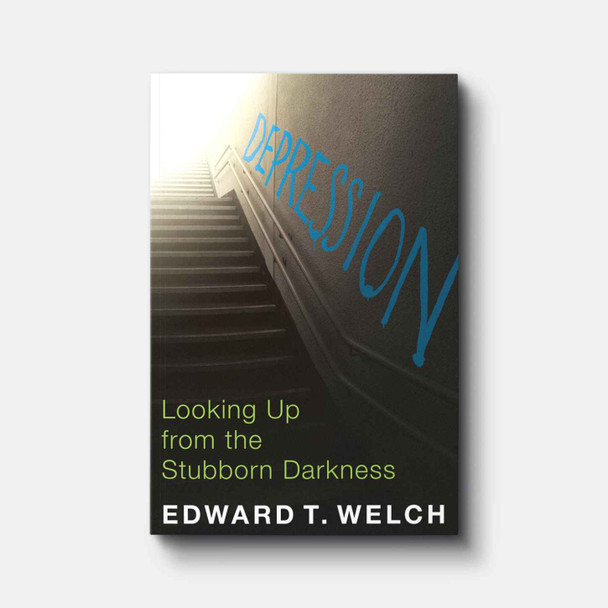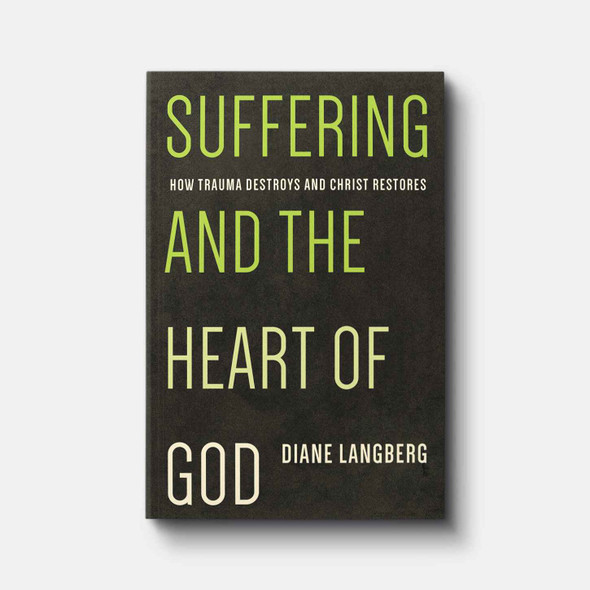Depression: Looking Up from the Stubborn Darkness
- MPN:
- 9781935273875
Videos
Hide Videos
Show Videos
Description
Best-selling author Edward T. Welch delivers a clear picture of gospel hope in Depression: Looking Up from the Stubborn Darkness for those who struggle. In this life-changing guide, Welch shares biblical wisdom and examines how the rich treasures of the gospel apply to our everyday lives in the midst of suffering and depression.
The peace, comfort, and hope of Christ are laid out in front of the reader instead of "cure-all" formulas—offering a compassionate perspective on the complex nature of depression. With biblical understanding, Welch moves past the mere symptoms of depression and shines the light of Christ on every page.
Through his own personal empathy and long counseling experiences, Welch addresses one of the most common issues people face today. Depression: Looking Up from the Stubborn Darkness provides practical help for a particular kind of suffering, cultivating compassion generated by the love of Jesus. This is a must-have resource of anyone suffering with depression or walking alongside someone suffering with depression.
Edward T. Welch, MDiv, PhD, is a licensed psychologist and faculty member at the Christian Counseling & Educational Foundation (CCEF). Ed has been counseling for over forty-five years and has written extensively on the topics of depression, fear, and addictions. His biblical counseling books include Shame Interrupted, When People Are Big and God Is Small, Addictions: A Banquet in the Grave, Depression: Looking Up from the Stubborn Darkness, Running Scared: Fear, Worry, and the God of Rest, Caring for One Another, A Small Book about a Big Problem, A Small Book for the Anxious Heart, A Small Book about Why We Hide, I Have a Psychiatric Diagnosis, Someone I Know Is Grieving, Fear Is Not a Sin, The Humility Project for Men, and The Humility Project for Men Study Guide.
Endorsements
"I cannot overstate the importance, timeliness, and helpfulness of this book. Ed has given us the wisdom that only comes from a heart shaped by the gospel and a deep compassion for people, generated by the love of Jesus. This is a must read and a must share."
Scotty Smith, Senior Pastor, Christ Community Church; author of The Reign of Grace and Objects of His Affection
"An all-too-rare combination of gospel understanding, biblical wisdom, personal empathy and long counseling experience shines through these pages. What is most needed is a course of divinely prescribed anti-depressants. Like a skilled spiritual pharmacist, Ed Welch fills that prescription for us."
Sinclair B. Ferguson, Senior Minister, First Presbyterian Church, Columbia, SC; theologian; author of The Christian Life
"I have come to rely on Ed Welch and others at CCEF for guidance and insight in better understanding the issues of the soul that plague many people today. For those who want to address more than just the symptoms of depression, Ed's counsel is invaluable."
Bob Lepine, Cohost, FamilyLife Today
MIX, MATCH & SAVE
Apply coupon code MIXNSAVE to your shopping cart
- Buy any 10 - 24 products and save 25% off retail price
- Buy any 25 - 49 products and save 30% off retail price
- Buy any 50 - 99 products and save 35% off retail price
- Buy any 100 or more products and save 40% off retail price
*Some exceptions apply
27 Reviews
-
Refreshing book on Depression
Great book on depression from the Biblical Counseling perspective. It's open to secular methods and diagnoses but is strongly biblical. It's a breath of fresh air from the biblical counseling camp.
-
Very helpful
Presents hope and help for depression. Notes many causes and encourages us to look for clues to our cause and then helps us deal with each cause. Treats depression as pain and suffering and shows how the Bible teaches that suffering has a purpose and so does your depression.
-
Excellent
I'm encouraged after reading this book. After the death of my 26 year old son in 2013, discouragement has been unwanted visitor. I'm grateful for men wise in the scriptures to remind me of His sufficiency and love for me.
-
It will pull at your heart on every page
Edward Welch is a gifted author and caring person. I've read his book on Anxiety and now this one on Depression. Note- if you or someone you know suffers from depression, you don't want to be reading this book in public. It will pull at your heart on every page and leave you sobbing (in a good way most of the time)!
-
A very practical book
I had this sitting in my Kindle for months before I finally decided to read it, partly because I just wasn't sure if I really wanted to read yet another book on depression. So glad I started reading it. It is by far one of the best and most practical books I have read on depression. There has already been a lot said about the book so I will only add that if you are struggling with depression or know someone who is this is a must read.
-
A holistic view of depression
This book is for Christians who know what it is like to “walk through the valley of the shadow of death.” At one time or another, that is all of us. While the book is grounded in Scripture, it is mindful of medical, psychological, and historical perspectives on depression. It does not discount any treatment approach, but it asserts that any method apart from deep spiritual soul-searching will fall short of the mark. It is a compassionate book, full of loving understanding and gentle exhortation.
-
Looking up from the stubborn darkness
The great preacher Charles Spurgeon often battled with bouts of depression. In deep ways he wrestled with a most heinous mental health issue which plagued him most of his life. In the midst of ministering to others he remarked that, "I have sometimes been the means in God’s hand of heling a man who suffered with a desponding spirit. But the help I have rendered has cost me dearly. Hours after, I have been myself depressed, and I have felt an inability to shake it off." He continues in another place; “I am the subject of depression so fearful that I hope none of you ever get to such extremes of wretchedness as I go to. But I always get back again by this–I know that I trust Christ. I have no reliance but in Him, and if He falls, I shall fall with Him. But if He does not, I shall not. Because He lives, I shall live also, and I spring to my legs again and fight with my depressions of spirit and get the victory through it. And so may you do, and so you must, for there is no other way of escaping from it.” Depression, and it's wicked allies, are blind guides. Attaching themselves to the best of us with no regards to gender, education, social status, and leading us down paths we were never intended to travel. In my own battle with Depression, Anxiety, and a host of other issues, few things have helped me in the depths of my most desperate moments. Welch seemed to understand me as an individual made in the image of God and not merely an autonomous person afflicted with a mental health disease. He knew that in the recesses of my darkened heart there lay a seed of hope even if he had to dig past the layers of decay which had been building up the past 33 years. He had a keen awareness of the way I viewed my existence. The only thing you know is that you are guilty, shameful, and worthless. It is not that you have made mistakes in your life or sinned or reaped futility. It is that you are a mistake; you are sin; you are futility. Ugh! My soul groans at the very reading of that quote but he's quite right. It's not that I have made mistakes in the past, though they are many, or that I have sinned, it's that I am the very embodiment of those things. I remember that I was once alive and vibrant chasing after God Now, when I think of my status before the Almighty, pain floods in knowing that I am no longer so.I spend countless hours remembering the passion which once ran through my veins like fire. I remember that I was once enjoying a closeness with God that has now been severed, or seemingly so. I trust in the sovereignty of the triune God of the Bible who sits enthroned on the seat of heaven but I wrestle with questions of suffering and his goodness. I wrestle with the reason he chose to play things out in the way they have. What has helped most, in addition to the Scriptures, are the Confessions and Catechisms in which my doctrine finds adequate summary. I find in the Heidelberg Catechism a powerful remedy for the despair I face when walking through my darkest of days. Q. What is your only comfort in life and in death? A. That I am not my own, but belong - body and soul, in life and in death - to my faithful Savior, Jesus Christ. He has fully paid for all my sins with his precious blood, and has set me free from the tyranny of the devil. He also watches over me in such a way that not a hair can fall from my head without the will of my Father in heaven; in fact all things must work together for my salvation. Because I belong to him, Christ, by his Holy Spirit, assures me of eternal life and makes me wholeheartedly willing and ready from now on to live for him. What a remarkable confession to utter when walking in the valley of the shadow of depression. The very utterance of them can make the faintest heart return with life. Surely there are days when I can barely concentrate or where the anxiety is worse than usual, but I remember that G, in his infinite wisdom, "knit me together and formed all my inward parts." (Psalm 139:13-14) Welch echoes the words of the confession in various places warming even the coldest soul. He comments that "Hope is risky" and quite rightly follows that up with an explanation why; "Underneath depression's veil of passivity is a heart that is busy making choices. Sometimes you prefer hopelessness. You want it. You aspire to it. Isn't that a reasonable way to explain why you are so immune to encouragement? You hear the words and understand them, but you don't want them. Even though self-pity and your attempts to kill hope are not working well, you are loyal to your hope-killing strategy." Can you see why Hope is risky? Hope is risky because it gives opportunity for failure. Hope can be dashed and trampled on the floor, that is, if hope lies on what is seen and what can be gained through our own efforts. We have a mediator in heaven who will never leave our hopes unfulfilled. Depression may be full of paradox at every turn and yet God works in ways we cannot understand this side of eternity. What works the best in the midst of relentless pain and suffering is a relentless love. "Depressed people, like all of us, are aware of kindness and love that is willing to sacrifice. Love always leaves its mark. As a result, depressed people who do best are cushioned by preserving love." We as Christians know of a relentless, pursuing, and preserving love. We have seen it in the face of a man bloodied and hanging on a cross. We have seen it in the very act of the Christ who stepped down from heaven, taking on our very nature, and yet was without sin. We see this love in a suffering servant who. though despised and rejected, bore our sicknesses and carried our pains. A man crushed because of our iniquities and pierced at the very act of our rebellion. Love has none great than that servant who laid his life down for his sheep. In the midst of your darkest pain, in the groaning of your most deepest suffering there is hope. Not merely a hope for right now but a hope which lasts into a glorious eternity with the author of that very hope. I will leave you here with the grace-soaked words which Welch himself concludes his most compelling volume yet; "Your own heart has much to say, but let Jesus have the final word. 'Grace' is the shorthand. In that one word, God takes us out of ourselves and turns our attention onto him, the One who showers forgiving love on us even when we don't realize all that he has forgiven. It is brimming with promises and guarantees....In your battle with the manifold features of depression, Grace to you."





